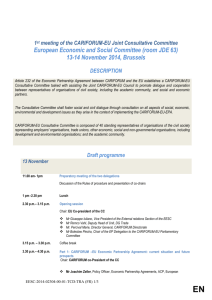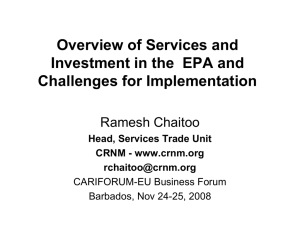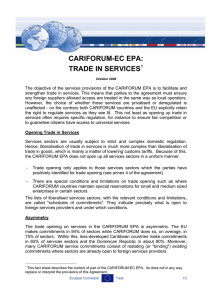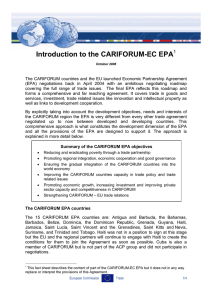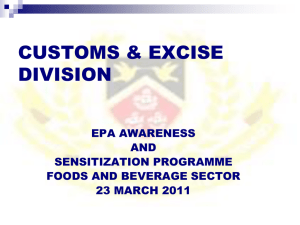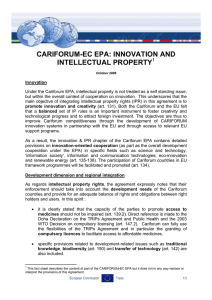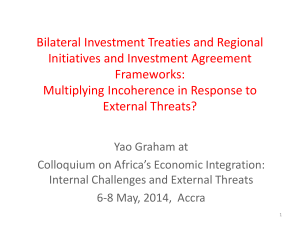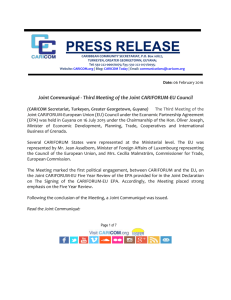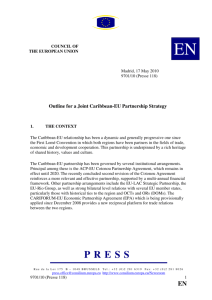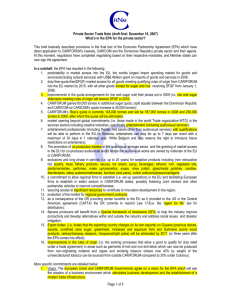CARIFORUM-EC EPA: TRADE IN GOODS 1
advertisement
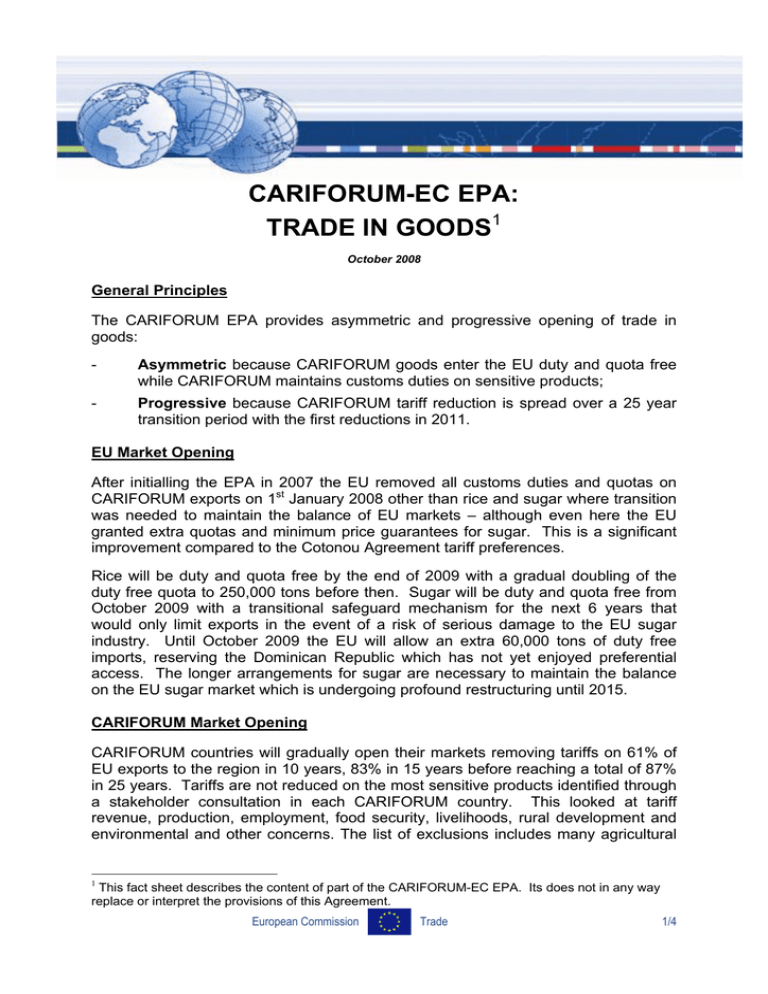
CARIFORUM-EC EPA: TRADE IN GOODS1 October 2008 General Principles The CARIFORUM EPA provides asymmetric and progressive opening of trade in goods: - Asymmetric because CARIFORUM goods enter the EU duty and quota free while CARIFORUM maintains customs duties on sensitive products; - Progressive because CARIFORUM tariff reduction is spread over a 25 year transition period with the first reductions in 2011. EU Market Opening After initialling the EPA in 2007 the EU removed all customs duties and quotas on CARIFORUM exports on 1st January 2008 other than rice and sugar where transition was needed to maintain the balance of EU markets – although even here the EU granted extra quotas and minimum price guarantees for sugar. This is a significant improvement compared to the Cotonou Agreement tariff preferences. Rice will be duty and quota free by the end of 2009 with a gradual doubling of the duty free quota to 250,000 tons before then. Sugar will be duty and quota free from October 2009 with a transitional safeguard mechanism for the next 6 years that would only limit exports in the event of a risk of serious damage to the EU sugar industry. Until October 2009 the EU will allow an extra 60,000 tons of duty free imports, reserving the Dominican Republic which has not yet enjoyed preferential access. The longer arrangements for sugar are necessary to maintain the balance on the EU sugar market which is undergoing profound restructuring until 2015. CARIFORUM Market Opening CARIFORUM countries will gradually open their markets removing tariffs on 61% of EU exports to the region in 10 years, 83% in 15 years before reaching a total of 87% in 25 years. Tariffs are not reduced on the most sensitive products identified through a stakeholder consultation in each CARIFORUM country. This looked at tariff revenue, production, employment, food security, livelihoods, rural development and environmental and other concerns. The list of exclusions includes many agricultural 1 This fact sheet describes the content of part of the CARIFORUM-EC EPA. Its does not in any way replace or interpret the provisions of this Agreement. European Commission Trade 1/4 products as well as industrial and clothing products. A full list of exempted products see is available via the CRNM on http://www.crnm.org. WTO Compatibility One of the key principles of the multilateral trading system and the World Trade Organisation is the so-called "Most Favoured Nation" (MFN) principle. This principle entails that, whenever any WTO Member grants a trade advantage to another Member (for instance lower customs tariffs for products imported from that Member), it should automatically extend this to all other WTO Members. In other words, WTO Members are not allowed to discriminate imported goods on the basis of their origin. However, there is a specific exception to that principle in the case of Free Trade Agreements (FTAs) allowing FTA partners to grant each other a more advantageous (i.e. "preferential") treatment without having to extend it other trading partners. This option is only available for agreements which establish a Free Trade Area, namely agreements leading to the liberalization of "substantially all trade" in goods between the parties*. Substantially all trade is often understood to mean liberalization of 90% of the trade in goods between the FTA parties over a maximum of 10 years. In the light of the development orientation of the EPA and the EU and CARIFORUM have decided to adopt a more asymmetrical and phased approach to trade opening whereby the EU immediately opens its market for 100% of CARIFORUM imports, whilst CARIFORUM gradually open their market to 87% of the EU's products. * Article XXIV of the General Agreement on Tariffs and Trade The regional liberalisation schedule also caters for the needs and possibilities of individual CARIFORUM countries. This means that larger, more competitive countries such as the Dominican Republic (which already has a free trade agreement with the United States) are going further in their liberalisation commitments than other, smaller CARIFORUM countries. There is a standstill clause preventing the increase of duties and charges other than tariffs (including various kinds of discriminatory levies and surcharges additional to normal customs duties). These will be phased out over a 10 year period, starting seven years after signature. All export duties are eliminated immediately upon entry into force with limited exceptions for Guyana and Suriname. Customs Revenues The gradual elimination of customs duties by CARIFORUM countries will lower the level of revenue these countries can draw from import duties. But this is not the whole picture. Lower duties and enhanced growth fuelled by the EPA can increase Government revenues and the EPA includes provisions to minimise any negative revenue impact from trade opening. These include: European Commission Trade 2/4 - Long transition times to adapt - reduction of customs duties will only start in 2011, and be implemented gradually over a period up to 25 years; - There are no customs duties on half of EU exports to CARFIFORUM under the current tariff regime; - The EU is not a major trading partner for good imports to the region; - Customs duties will remain on a significant number of revenue sensitive items like dairy and meat products, whiskies and some jewellery; - Products committed for early duty elimination are mainly those low tariffs; - The EU will work with CARIFORUM countries to make their tax systems less dependent on customs duties and improve the efficiency of revenue collection; Finally, it should not be forgotten that tariff reductions help to reduce the cost of imports. Inputs for CARIFORUM business sourced from Europe will become cheaper boosting competitiveness, exports and economic growth. Safeguard Measures There are extensive Safeguard measures to protect against import surges that cause or threaten to cause serious injury to industry. These are asymmetrical making it easier for CARIFORUM to apply than the EU. In addition, CARIFORUM countries are exempted from any multilateral safeguard measures the EU might take for a renewable five-year period. If removing import duties still seems to cause serious problems then the CARIFORUM countries can ask for the re-phasing of commitments within the overall transitional period for tariff elimination set for the product concerned. In the light of their special development needs, the EPA allows the more vulnerable economies (Antigua and Barbuda, Belize, Dominica, Grenada, Guyana, Haiti, Saint Lucia, Saint Vincent and the Grenadines and Saint Kitts and Nevis) to modify their trade opening provided the overall agreement remains compatible with WTO requirements. The Most Favoured Nation (MFN) Clause The EPA includes an asymmetric MFN clause. If the EU enters into subsequent trade agreements granting better treatment for trade in goods with other countries than the EPA then this will automatically be extended to the CARIFORUM countries. For CARIFORUM, this clause only applies to agreements with a major trading economy defined by thresholds designed to apply to developed countries and a European Commission Trade 3/4 limited number of major emerging economies. This means better treatment can be granted by CARIFORUM to other developing countries without extending it to the EU. The MFN clause does not apply to cases where the better treatment is granted as part of a regional integration process – it therefore does not apply to deeper integration within the region. Regional Preference In addition to carving out CARIFORUM regional integration schemes from the MFN clause, the EPA also promotes integration by barring the EU from receiving any treatment better than the CARIFORUM countries grant themselves. Put differently, any tariff concessions they extend to the EU also have to be granted to fellow CARIFORUM countries. Transition periods are provided for. Other Aspects of Trade in Goods The EPA provides for development cooperation to making market access effective and commitments on tariffs and quotas are complemented with articles to improve cooperation in areas like customs and trade facilitation, rules of origin, technical barriers to trade, and sanitary and phytosanitary measures. The EPA rules of origin are also significantly more flexible than Cotonou Agreement in the areas of textiles and clothing and offer improvements in agriculture and fisheries. There is a general clause for a review of these rules of origin with a view to further simplifying them in the light of CARIFORUM development needs Rules of Origin Improvements: Textiles and Clothing Under the Cotonou Agreement garments had to undergo double transformation (i.e. from yarn to cloth and from cloth to garments) to get preferential access. The EPA allows single-step transformation meaning CARIFORUM countries can import cloth from world suppliers to manufacture garments and export them duty free to Europe. European Commission Trade 4/4
